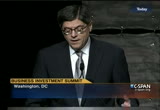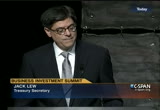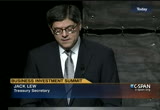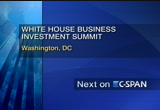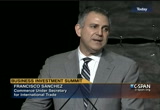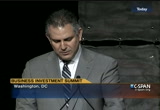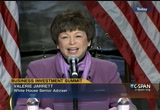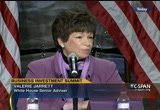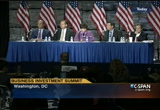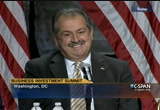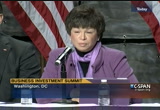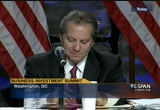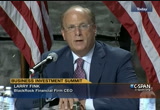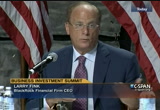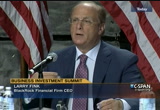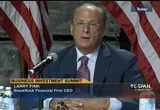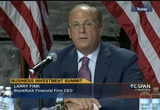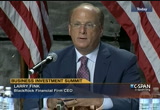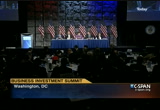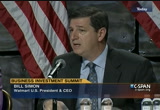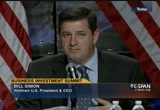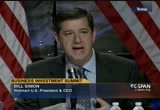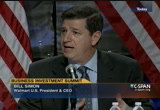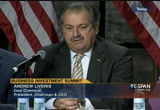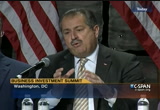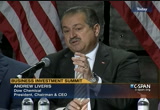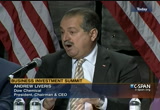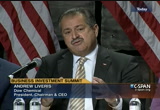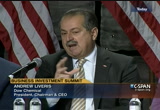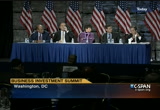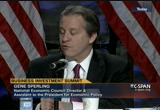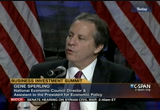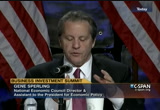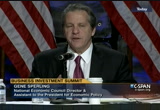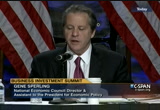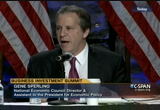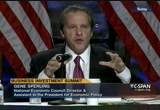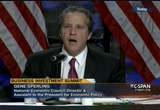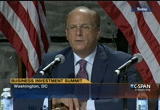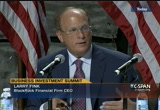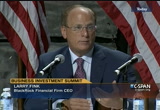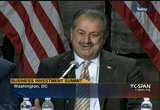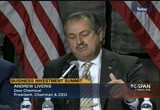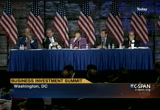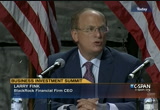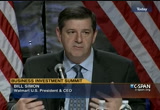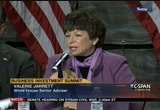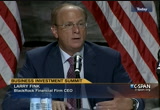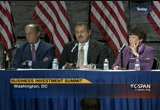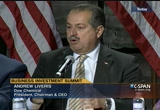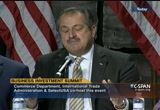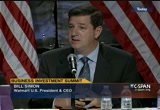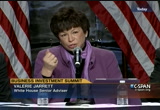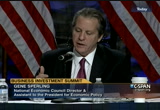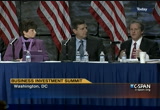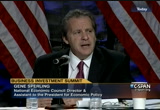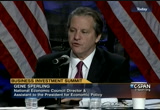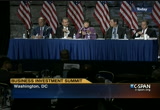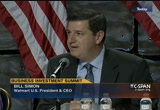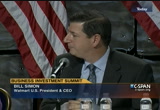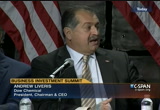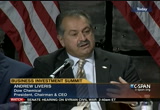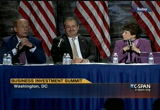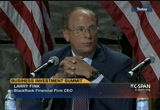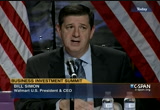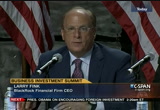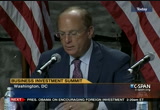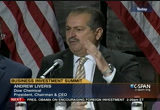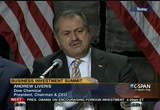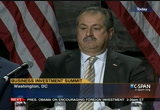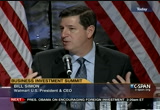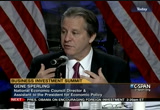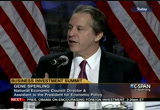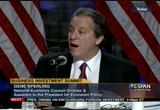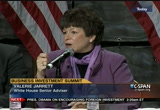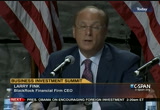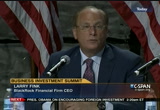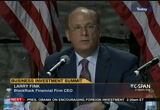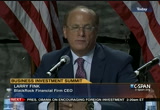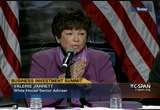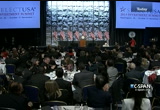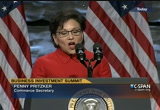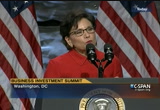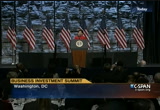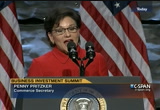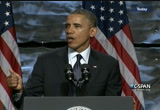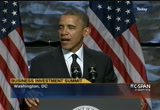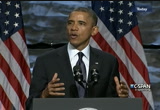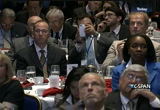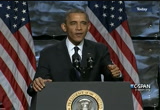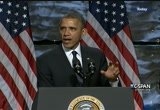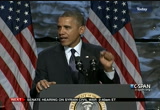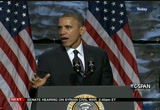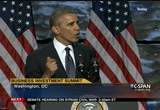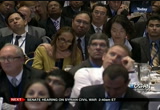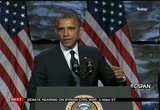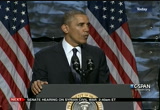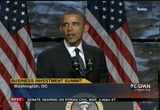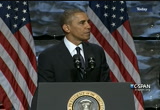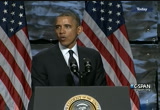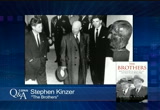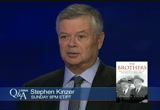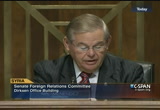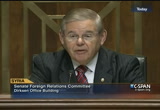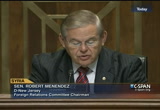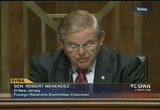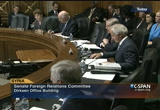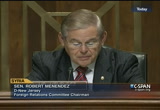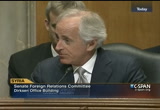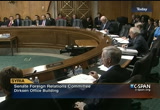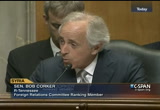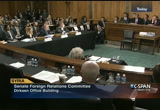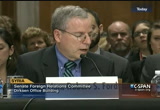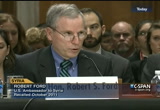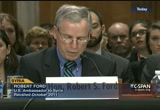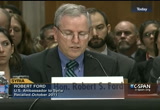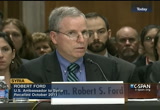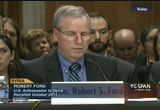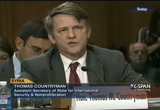tv Key Capitol Hill Hearings CSPAN November 1, 2013 1:00am-3:01am EDT
1:00 am
gdp compared to other advanced economies. our code is also full of special interest tax breaks and loopholes while hurting others that are investing in the united states. we can do better. and we can do this by broadening the tax base and lowering tax rates in a way that doesn't add a dime to the federal deficit. the president put forward the details of his tax reform and pleadmead clear his commitment -- and has made clear his commitment to business tax reform paired with an infrastructure package paid for with one-time revenue. we have a real opportunity ahead to seize the tax reform and establish a simpler, fairer and more competitive tax reform in the yeats. -- years. they share much in common with the approach the president has put forward. there's no reason we can't start with the substantial policy areas we agree on and come together to find common ground. in addition to reforming our tax system, we must finish the work of creating new trade agreements that are free and fair.
1:01 am
they must open up markets for america's businesses and must add to the millions of american jobs that are currently supported by trade. as congress comes together in support of trade deals we'll help expand the biggest, -- the biggest mark place in the global economy and rere-inforce the position to invest and export. to that end, we're working to complete a transpacific partnership. this will boost exports and level the playing field in the asia pacific. i want to point out that the united states welcomes investment from around the world, from every type of intrep -- enterprise, and all sectors. we are scommitted to mane taining the most open and transparent investment environment. our process for reviewing national security cases of foreign investment in the united states focuses solely on national security considerations and reviews are pleated within a
1:02 am
-- completed within a period of one to three months. so as we press forward, we know where we need to focus our efforts. the prioritiest just outlined are clear and doable. they amount to real solutions that will make a real difference for our economy now and in the future. and i'd like to close by thanking the commerce department for hosting this summit, as well as everyone in this room for coming today. america has always been known as the land of opportunity. a place where you can make it if you try. and have no doubt, opportunity in the united states is very much alive and well. it's alive for our workers, it's alive for our businesses, and it's alive for all of you who invest here. thank you very much. [applause] at the commerce investment summit, ceos talk about the investment climate and the policies to attract foreign investment. some of those include
1:03 am
immigration and energy. it is moderated by valerie jarrett. [applause] >> good morning, everyone. secretary lew, secretary pritzker, thank you so much for your very excellent remarks. and i want to thank both of them for their leadership. they have been outstanding, particularly for the subject matter that we have before us these next two days. i know that their insights, particularly as it applies to the business community, are very valuable to all of us that are joining us today. we're off to a great start to what promises to be a great conference with a packed agenda. thanks to all of you who have come great distances to be with us today. i am very pleased to announce our first panel, which is entitled why select the usa?: perspectives on investing and
1:04 am
operating in the united states. this is going to be a very informative and valuable discussion and it is also my pleasure to introduce the moderator of this panel, an important member of president obama's white house team, valerie jarrett is a senior advisor to the president and a long-time confidant of the president. she oversees the office of public engagement and intergovernmental affairs and chairs the white house council on women and girls. prior to joining the obama administration, she was the chief executive officer of the habitat company. valerie has held positions in both the public and private sectors and hails from chicago before coming to washington, d.c. ladies and gentlemen, please give a warm welcome to valerie
1:05 am
jarrett. [applause] >> well, good morning, everybody. you look fantastic out there. we are also delighted to be here. i would like to begin by congratulating secretary pritzker who has hit the ground running since her appointment. she has not only traveled around the world, but she gave a party and everyone showed up. i also want to give credit to former secretary gary locke who was the brainchild for this a few years ago. please stand up so we can welcome you. [applause]
1:06 am
you will be hearing from president obama later today, but that me say a few words about why this summit and why select usa are so important. for the president, encouraging investment in the united states is a core part of his strategy to build and grow our economy. the u.s. remains the largest economy in the world, and is the largest recipient of direct investment from foreign countries, as the secretary mentioned. the competition from your partnership is fierce. it is global. the united states can no longer rely on being the biggest economy or the obvious choice. we have to work every day to do our very best. select usa is the result of it the president's broad commitment to make it easier to do business. we are centralizing resources to give information and assistance you need to navigate the u.s. marketplaces.
1:07 am
that is why it is so important we are joined i representatives of state and local governments because they are partners in this effort. he should leave today with resources and relationships that you need to make select usa work for you and for your businesses. put simply, we want your partnership, and we are going to work hard to earn your trust and your confidence so you do select usa. i am thrilled to be joined on the stage by a great panel of business leaders who can offer there's perspectives on why the united states is such a dynamic destination for your capital. first, let me introduce larry fink, the chairman and ceo of blackrock. he has been a great partner to the administration. we have benefited greatly from his global advice about the economy. he is the largest asset manager in the world, and his counsel and advice have been important over the last five years to the president and his economic team.
1:08 am
larry convened a group of very large global investors several months ago, and that was the fruits in the beginning of our decision to have this large conference today, so, larry, thank you for your leadership and for being here. we enjoying -- please join me in welcoming larry. [applause] next i would like to introduce andrew liveris the chairman and ceo of dow chemical. we see him almost every week. he is the kind of ceo who rolls up his sleeves and is not shy about his advice. he serves on a president's council and was appointed co- chair of the advanced manufacturing partnership. someone whose advice and counsel we appreciate. please join me in welcoming andrew liveris. [applause]
1:09 am
we are joined by bill simon, the president and ceo of walmart usa. we work closely with bill and walmart on a range of issues important to the president and our comedy. this summer bill confided secretary pritzker to florida where he had a conference of many of his major suppliers encouraging them to invest in the united states, and he has been a partner with the administration on a range of issues, including the first lady's let's move initiative, and also taking an important position to encourage veterans to look the walmart as an opportunity for a job after they leave the military, and has set a standard that is very hard and high for everybody to match around the country, because after serving our country, the least we owe our veterans is a job when they return home. these welcome bill with us as well. -- please welcome bill with us as well. [applause] last i would like to introduce my buddy, gene sperling, and the secretary gave him credit he so
1:10 am
wells deserves for helping put together this forum, but he is the longest-serving director of the national economic council in our nation's history. he is the brain behind all the president's major economic initiatives and has put in place and he is a force to be reckoned with within white house. he is known for coming in early and staying late and burning the midnight oil that has given his heart and soul to our country over many years. these join me in welcoming gene. -- please join me in welcoming gene. [applause] let's kick things off, and i would like to ask an opening question about why businesses or investors should be bullish on opportunities in the united states. can you give us your sense of
1:11 am
raw specs for the u.s. economy and why the united states is a good place for investment, given global opportunities, larry? >> i can answer that in two parts. one is at an investor who helped companies come to markets in bond markets and as an investor in companies worldwide. first and foremost, we have the most resilient capital markets in the world. we have the safest capital markets in the world. and years ago we credit sarbanes-oxley, and 10 years later we have now witnessed more ipo's than ever before. we are seeing young companies coming here, but not just young companies. we are seeing more international companies seeking to come here. the primary reason as an investor, we have more confidence in the financial statements of these companies, especially young companies, that we do not have a long history understanding and they do not have a long history of having
1:12 am
strong and robust financial statements. but you feel much more confident that a regulatory process, which sometimes is so maligned in this country and it is absolutely wrong, companies are now seeking to come to the united states to find sources of capital, because the investors worldwide are willing to invest in the u.s. markets much more than these other exchanges worldwide. that is a first and a really unspoken issue related to the united states today, and today we have a couple large companies that are talking to the new york stock exchange for a listing that would be a real statement about the difficulties of investing overseas versus bringing their companies here and listing here in the united
1:13 am
states. let me turn to, as an investor in these companies, and most of the out there, because we are the largest owner of equities worldwide. let me talk about the united states specifically which makes us so instructive on the country today. first and foremost, we were the quickest to resolve our ranking crisis. europe is going to the third round of stressing their banks. we did that for years ago. as a result of that, our banking system is asterisk ever. the weakness of our banking system, there is not enough money for loans, and you cannot save that for other parts of the country, and linking that the capital markets, we have the most robust banking and loan market. second is the drag on our
1:14 am
economy from housing, despite there are still great pains related to housing, but we went from housing markets that had over 5 million excess homes to an economy where we will be building 700,000 homes today. that will add jobs, opportunity, and will be a source of commerce for all companies that are trying to sell components to housing. let me add one more component. as housing and construction bills, small business does because a major component of small business is in the form of construction. the third reason why i am instructive is our industry sector. i am surprised that only a few years ago people did not realize the change of technology and what that has done in terms of extraction of carbon and refining of carbon. i am sure andrew will talk about this in a minute. we have gone from a country that has on very dependent from importation of carbons to a country that exports carbon.
1:15 am
this will be a major change, and as we see mexico changing and the verbalizing their energy law, it will only empower texas and other components of this country, and i believe having a stronger mexico only makes the united states in even stronger. this will become another major component. let me talk about a few things that people just do not talk about enough, and that is our energy cost. at blackrock, we have two major data centers. one in washington, on the columbia river, and one that we are building right now in buffalo, new york. we are paying approximately 3 1/2 cents per kilowatt. if i had to do these data centers in europe, i would be paying $.18 per kilowatt. in other parts of europe, it is over $.80 per kilowatt.
1:16 am
we have cheaper energy, have cheaper cost of energy for manufacturing, and then the last thing, why i am very constructive on the united states and where we spend a great deal of time is our educational system, which unfortunately a lot of people malign that today. this will be discussed later, but we actually have more students overseas than any other country in our educational system. what you come here? it is not just the quality of education, but the type of education. some of the disadvantages of education globally, so many people are taught rote or talk facts. this may work very well or testing scores, and i'm not trying to diminish that at all. but i do believe that the advantage of the american style of learning, which should get more credit, is the ability to be thoughtful and critical
1:17 am
thinking. as an employer who hired 1100 employees this year, i will tell you over 80% of our employees come from u.s. universities. we will continue to have that position. as an employer who has offices in 38 countries, the bulk of our employees come from the united states universities, and what we are looking for, people who know how to think and think creatively. >> thank you, larry. let's shift to bill. as our nation's largest retail, you have sourced from all over the world. you made a decision to increase your sourcing in the united states. could you give us a perspective on why that decision was made? >> thank you. let me thank you and the secretary and the president for their interest in energy around this initiative, because it truly is an incredible time in the history of the country and
1:18 am
in this particular area. it is a math equation. the math equation is never in a generation or maybe longer been more favorable for investment in the u.s. we just heard about energy costs. that is one component. and the labor and transportation components that earlier in decades led to the migration of some manufacturing outside the unit as are all in our favor. if you think about it, the math equation favors expansion of manufacturing, and so earlier this year we made an announcement that we were going to increase our u.s. purchases i -- by $50 billion in 10 years. that is $50 billion in 10 years, it is not $5 billion year, it is projected to be about $250
1:19 am
billion in additional spending over the next 10 years. it is a major commitment and it is done because of math and economics for us. as you mentioned, we hosted a bit of a summit similar to this of all the suppliers that we deal with and the state and local governments that we heal with, brought everybody together in orlando and kick this off. we had 1500 people in 34 states and eight governors join us, and the exciting thing was we had an outcome that launched hundreds of projects. we have been able to announce initiatives that will add 1600 jobs to begin to get this ball rolling. after the event today we are going to make an announcement with three more great companies invested in u.s. manufacturing today. we hope you all keep an eye out for that. it is an exciting time and the opportunities for the u.s., and
1:20 am
one of the points i want to make and everybody should take note of it is there is a significant and distinct first mover advantage. if you are a state or local development officer, there's a distinct first mover advantage because as you begin to build capability and get investment, you will get component parts from it, and we have seen manufacturing in investment grew that way. be first. if you are an investor looking for an opportunity to invest money, there is a distinct first mover advantage in markets as we go forward. for our part, as the largest retailer in the world, and in the u.s., we believe and see the interconnectivity of the global economies, at a healthy and vibrant u.s. economy is very important to the global economy. investment in the building of the american middle class and the many sectors will make us a more robust economy so we can trade better with our partners. just the laws of efficiency would suggest with transportation costs increasing, the availability of inexpensive fuel and energy in the u.s.,
1:21 am
capital markets, free and stable and lowest interest rates in a particular member which just now is and it is immediate. as we think about where we are going and how we are going, we are very pleased to be able to participate. from our part, certainty is important, important how we deal with each other, how we deal with business. what we can provide is the certainty of a purchase order or contracts, so as companies look to establish and build manufacturing bases in u.s., we are changing our policies and making more longer-term commitments so they can't have the certainty to invest capital here. if we can output any decisions, we have a team that we have put in place and they are ready to serve and ready to do business. we appreciate being here and look forward to the rest of the panel.
1:22 am
thank you. >> thank you, bill. andrew, speaking of manufacturing, you have worked closely the administration over the last five years. you have advised us on a range of issues that would make the united states more conducive to investment and manufacturing, one example being corporate tax reform so we reduce the rate for manufacturing and how that helps spur additional investment. give us the sense of being a global player in the coming from australia, give us a sense of what you think is a special about the united states. >> thank you, valerie, enter the panel here, and congratulations on making the decision to be part of team usa and the conversation we are having here. one thing that valerie did not mention is as an australian, global citizen, that has been with the great dow chemical company for 37 years, 22 of
1:23 am
which i spent in asia, around china, when i came back to the united states over a decade ago, i was struck at the conversation going on in america that did not include manufacturing. how red manufacturing in america, and the psychology of consumers and our media and everywhere was assembly-line, smokestack, and it was yesterday's manufacturing. we had done it to ourselves. the notion that label costs would drive the manufacturing there had become what everybody leave it. so i think you did not mention this, but i read a book in my spare time as i travel to grow, looking as i traveled the globe, and they've recognized two important parts of the manufacturing value chain that the administration has embraced and which i applaud. i'm sure gene will touch on
1:24 am
markets, that where production follows, innovation goes. the ecosystem we celebrate in this great country run universities and institutions and government r&d and how that is a precursor, the famous l labs and love labs that preceded them, 70% in the r&d is spent in the manufacturing sector for the reason. you understand the stakes, you attach researched it, and the next iteration product occurs from that. that ecosystem was not in the national conversation until the last several years. by putting it into the conversation, we can reverse the trend, that we can actually keep an ovation here. this day fact from a china perspective, i would go around the world, in 1990, china had four arab-owned -- so they have gotten it, and it is not just in china come it is
1:25 am
germany, singapore, thailand, that compete as companies, these countries. for the united states to have this notion that it should be competing for business like a company was not about the government or small government. that dumbs down the debate. instead, it sets the rules of the road that lets the united states to become a gold medal athlete. it needs that liquidity, the financial system, to be the very best. larry talked about it that. it means the nervous system and the brains to be that fast, the innovation center, and bill and others touched on that as well. the imp is to actually build innovation ecosystems around the country, not with new money, but directing money between the
1:26 am
public and private sector in a smart way. what is the brawn? natural resources, in this newfound energy advantage in the united states and putting it to good use to allow the united states become an export machine but to really take not just liquids, but solids and athletic brains of the broad brain and liquidity -- team usa is there. as far as i'm concerned, as i travel around the world and i come back to the u.s. and i get asked where is the bright spot here, it is here. it is for hours to squander. we can definitely get it wrong, and we have got to get all must to get it right. long story short, i think to your question, advanced manufacturing of the nanotechs, sustainable manufacturing, sustainable supplies, advanced manufacturing of robotics, of the bio kind, that is all occurring at the intersections of markets and sciences.
1:27 am
and the united states, because of this entrepreneurial system, because of what it teaches in the schools, specially universities, because of the way kids grow up in the system, to look at opportunity, not a problem. to go at the answer, to work out the how to make the path were green,et more how to reduce the human footprint on the planet -- these are the things that make united states the attractive part of the work to invest in, because you can do it here. 70% of all the dow r&d in united states is done in the united states. right now the united states is unbeatable for that. second, the value added on resources, how is putting its money where its mouth is. we're putting 5 billion dollars against the national gas advantage that was talked about. we are putting thousands of jobs at work. this will create up to 2 million jobs in the next several years.
1:28 am
a lot of that will be exporting brains and of course a little bit of brawn. >> thank you, andrew. [applause] having heard from these three global business leaders, gene, i know one of your strengths is officiating the long-term growth of our country rests with private sector job growth. help the audience understand how in creating policies you think about the comments you've heard this morning and what you have heard of the course of your was first running for president, he very much had a focus on what you have to do to lay the foundation for the private sector to make the united states a magnet or job
1:29 am
creation. i think in 2011 there was a bit of a sea change in the following way. you started to see some of our major business consultants coming out with a message, which was quite a change to their clients. it was your analysis on cost that has led us in the past to recommend you considering locations, other places, those cost calculations have changed. when you look in the future over the next 10 years, which is what you should be looking for location decisions, the wage productivity factor now has turned around and will favor the united states, number one, and, two, the realization of the natural gas cost advantage. 50%-70% lower cost. in 2011, is also a greater
1:30 am
realization that there were hidden costs in having an overly diffuse and remote supply chain, and perhaps that was spurred by the natural disaster in japan, but all of these started leading to more reconsideration, which of what people were advising our own companies about this is also going along, as andrew said, if trying toe president make a focus that we should be looking at manufacturing, location, like we look at r&d. it is an innovation strategy. that location matters and has significant spillover impacts. now there was more wind at our back, and the president would be at his job's counsel where people would disagree, and yet you hear from both labor and major ceo's, where they would
1:31 am
say the u.s. may be the most competitive for location of jobs as it has been in three decades. for the president policy wise, you look and realize this is a moment of opportunity, to have a positive trend, you want to put wind at its back. on the manufacturing front, we do have had -- we did have advanced manufacturing partnerships and will soon announce the second, third, and fourth of our network and manufacturing innovation hubs. we have had to focus on higher education, all the things that are important to stability, attractiveness of jobs, and we were successful, as you saw yesterday, in having a dramatic fall in our deficit so our path is more stable than it was. but we do think that more needs to be done. i will put it into categories. one or more additional policies
1:32 am
that we need, cooperation from our congress to implement, to help make us more competitive and more attractive to you, and, second, is how we organize ourselves and the messages we send, which we have a little more control over. on the policies some of the , things the president is pushing right now, which do for all our divisions have more bipartisan support then you would think, is comprehensive immigration reform, which would increase the need for skilled labor that many people say is critical to their location decisions. so this is a very top priority of the president come as is making sure our training programs are more demand than, that we are working, you and community colleges, so if you want to locate here, there's someone who says if you are a little unsure whether there is a particular skill need that may not be met in a particular location, that we will work with you to make sure there is a training program that works for you. that is one area.
1:33 am
the second area which the president has put out is to have a grand bargain on jobs where you would lower the corporate tax rate, have a lower corporate tax rate, and at the same time use some of the one-time funds to strengthen our infrastructure so that your supply chains can move more quickly. these are important components we have to do. the third one is that we have to give and we fight very hard on this a greater sense of stability. i guess you could say we want more manufacturing and less manufactured crises. we have not been at our best the last month, but i think the future looks brighter in painting a picture of stability. now, the thing that is under our control is the signals we send. we had to recognize there were places where the signal that the president wanted to send was not coming through. one or two high- profile cases by be sending a signal that we were not open for
1:34 am
business. we want to make clear. this is not a xenophobic nation. if you want to come here and make your fortune, played by the rules, and invest in the united states, creating jobs, we do not just tolerate it, we welcome you with open arms. a lot of the motivation for this select usa conference was to in a very bold wait make that -- in a very bold way make that abundantly clear. secondly, how do we organize ourselves? the united states has generally organized itself in our embassies, etc., in ways that focus on commercial advocacy and export promotion. but our efforts at recruiting in united states, and this goes back administration after administration for decades has been more ad hoc. that is not good for us because we do not have an organized way of encouraging people who want investors to invest here, but it's not good for those who want
1:35 am
to do it either because it can seem ad hoc. it is not clear who is going to be there, who is going to help. when the president comes today, what he will talk about is a major reform effort to, for the first time ever, have the united states make an economic priority the encouragement of foreign companies to have job-creating foreign direct investment in the united states. this is not just an empty phrase. we are engaged in a very serious effort of having unprecedented coordination between congress department led by penny pritzker, state department by john kerry, working together with valerie, myself and others in the white house economic team. what this will mean is that in 32 32, to start, and the nations to start, for the first time ever there will be an organized team led by
1:36 am
ambassadors like ambassador lott, who work together with one departmentir state and commerce department officials. they will have one of their core the first time encouraging and facilitating foreign direct investment in the united states. they will have one channel they will go to to that kind of headquarters to -- so that when you're making a decision here, you will have one-stop shopping. you have one place you can go to to look at visa issues, regulatory issues, state and local, federal issues, and when it is helpful to talk to someone even theite house or president or vice president themselves, we will have a process for doing that. that is the major policy announcement that we are announcing today. 20 to 30 years from now you'll see this organization in place and people wonder why the united states had not started earlier making a corp. art of its international and domestic
1:37 am
, the stepper broader select usa reform. >> thank you, jeanne, for making that particular announcement. historically most of our investment in the united states has come from europe. today we are people from africa, south america, asia. i want to ask business leaders to respond to jean's comments and let us know does that sound right and is the more we should be doing. to need to change our strategy given that there is his opportunity for more expansive global investment shown by the interest demonstrated here today that his sister could been the case. let's start with you. >> i have the advantage of talking to ceos worldwide and in every conversation i have, valerie, they are asking about how can we find more opportunities here in the united states. so many manufacturers are trying to replicate what andrew and dow
1:38 am
chemical are doing. they're witnessing the cost of energy being dramatically cheaper, as much as 75% cheaper here than in other places in the world. as a result of that they're looking to move more and more manufacturing here. because the educational system here, more and more technology systems from japan, korea, other parts of europe are looking to have footprints, a foothold in the united states today. we are not an accident. country, when we have a problem we expel the problem. we always undersell ourselves as a nation, but the opportunities today, because of natural gas, because of oil production here, because of our educational system, and mostly also because our capital markets, more and
1:39 am
more companies worldwide are looking to add facilities here, our research center here, and i do believe we are going to continue to see this being driven. to be aot just going bicoastal phenomenon, it is going to be a phenomenon in the heartland, certainly in texas where we have such cheap energy. i was in india a few weeks ago -- one ofthe largest the largest manufacturers is building a plant in idaho a cousin of the cheap gas and oil from the balkans. visited one of the largest egyptian companies recently and they are building another plant in the united states. we arelly believe underestimating the power that we have as a country. every time i travel overseas, valerie, i am asked continually why we aren't more bullish ourselves. -- is our country not asking
1:40 am
from our perspective, this is the biggest opportunity we see in the world. and i think andrew said that. ini would add that we are 160 countries around the world and i get to travel like larry and others. clearly, recognize what i'm doing here. i'm a ceo of a global company. inlly, encouraging the usa investment. would they asked me to do the same. at the end of the day, advantages seldom sell. you have to channel those advantages. witching was referring to is that i've never seen a partnership between u.s. embassies in multinational global businesses as good as it is now. that is after decades of doing business. him, all the ambassadors that we have, there is a whole new mindset around cooperating, not just for american companies going to
1:41 am
those countries, but really the other way around. theability to get advantages that america has, that we're been talking about, innovation, new found energy advantages, the transparency of those and the fact that the rules are the rules of the rules. it may be dysfunctionality in this town, valerie, from time to time which we have to overcome, that is definitely one of the reason we get cynical views, that is one of the reasons we get comments like you are the greatest country in the world that you can manage yourself. you can't manage world's largest consumer market with an energy advantage, what do you have to do to go to that next up to be team usa and help this? thatnk this notion is nationstates compete like companies. we have to make our incentives clearer. incentive. that is a subsidy.
1:42 am
thinks is a level playing field. it is not. establishing the principles of free and fair markets for mutual access is an american ideal that we should be pushing as hard as we can to set the standard on trade. reminder, 16% of the global gdp is manufacturing, but it is 70% of the world trade. so we have to do it in businesses like mine. that encourages us to go to places where we will be treated fairly and to the new markets, the emerging markets and the other way around. emerging market companies can come to united states and will be trained there. >> valerie, just one at one thing. i was in south america, europe and asia in the last six weeks. i met government officials in every country. every government official was asking how we could create jobs. the one thing that is very clear
1:43 am
, when you look at the 10 year trend in the united states, as we all know, the manufacturing thatss has been so refined the human element of manufacturing has been reduced dramatically. obviously, this presents some social issues worldwide. are issues that every country is facing right now. because of the rule of law that and are just discussed, because of our advantages in cost of energy and also, if you look at our workforce and if you look at wages worldwide, there has been a compression of wages worldwide. 10 years ago everybody spoke about other parts of the world where was much cheaper to manufacture. if you add transportation costs, if you add the rule of law in this country, the cost of energy , this is why more and more
1:44 am
countries -- companies are trying to come here. this is why i am asked at every country today how can we create jobs. they're actually feeling insecure about the opportunities here. >> if i could add, we buy and sell products all around the world and we are as competitive as anybody in the u.s.. is isn't about oslo somebody else, it'd global interconnected world, efficiency would suggest that reduction occur closest to the point of consumption. as a talk about this, the emergence of demand in middle- class all across the world is going to absorb consumption capacity that exists today. i think what we're looking at is a fantastic opportunity that everyone is talking about. we are very excited about it. this panel is a great example of it. we have an administration that is making effective moves to support policy decisions that
1:45 am
will encourage it. we have somebody from capital markets saying that the capital markets are ripe for it. saying a manufacture that the manufacturing base that exists today favors expansion in the u.s.. we have somebody from the consumer market saying we do have ready come a willing and able buyers and consumers. other know what more you could ask for in that particular scenario to understand that there's an opportunity that exists today and now for us to take action. i'm excited to be here. mentioned immigration reform. it is interesting because we have seen over the course of the last five years and evolution in terms of the enthusiasm coming from the business community, not just for high skilled immigration, but for operands of immigration reform. i was wondering of each of you could say a bit about how you think that factors into our global competitiveness and the impact it would have on our economy. >> i would just say i was with the -- one of the more important
1:46 am
leaders of europe this past summer and the leader said to me , if united states passes regression law, shame on the rest of the world because we are going to be envious of the united states. that is part one. shame on us that we haven't passed that immigration law right now. all, i do believe it in thee dramatic premature growth rates of the united states. first and foremost we have 12 million people who are living in fear. if they had a path towards immigration -- toward citizenship, think about the new houses that would be purchased. look at the construction related to that. one of the difficulties we have and i'm sure everybody has trying to getn visas for some of the really smart foreigners who are graduating, and even undergraduate schools are having
1:47 am
a difficult time, to be a permanent resident, maybe even become a citizen here. willthat path and process make it much more advantageous to us. it is not just a technology problem, it is a problem for many of the companies in trying to have more workers. it would be very productive workers that will stimulate the economy. they will be buying houses and adding more and more to many other whole's livelihood. the immigration bill is going to be a standard that will .et us apart as a nation to that standard, in my opinion, is going to drive more and more commerce coming here. question that the accelerators to this great position we find ourselves in as a country, there is no more important than immigration. the business community understands that because it sees gaps and deltas in the workforce
1:48 am
that we are all filling in some way. very not perfect and it is very difficult. 600,000 stem jobs opened in this country right now where we can't get enough qualified candidates for. we do everything we need to do rescaling,e training dow put $250 million in a grant into 10 universities in this country to rebuild chemical engineering and chemistry departments. many of these companies on this panel, many companies are doing everything they can and not just at the phd and masters level, community colleges. we mention returning vets. many of us have curricular development and community colleges to get the modern factory worker trained, the modern technically skilled person who can work with ,obotics and advanced sensors nanotechnology and nano manufacturing. all of the things i said earlier, we're doing it ourselves. what we're finding is our kids
1:49 am
are just not as enamored with stem. his is part of what a and p version two and others and myself are going to be working on which is rebranding this notion that stamm is something our own workforce should be excited about. you are right, larry. everywhere i go, the issue before the world as we are not creating enough jobs. use unemployment is a chronic issue in most countries. the jobs of tomorrow, and the case of united states economy of today, our education system needs to catch up at our immigration system meets a catch-up. we can be the standard setter though. we can be the vanguard heard if we pass immigration reform and really get the flow of human talent of this country, wherever that may come from, even australia. if we can get some men and really be part of the system, all the advantages are here. i can think of no more pressing issue for team usa than immigration reform. >> thank you.
1:50 am
>> i would agree. if you think back in our history, every major growth. we have had in our countries history has been preceded by or led by immigrants. we are a nation of immigrants. if you believe in free enterprise, you have to believe in immigration and the taliban capability day choppers and consumers that immigration would bring would help fuel and drive that next level of growth. forwardaluate how we go , moving forward without addressing that issue would leave a problem that is been in existence in the country for quite a long time. could actually slow and dampen the opportunities that exist. i am very pleased that is one of the topics that is going to be addressed hopefully in the next few months. >> absolutely a top priority of the president. in secretary prisco's opening
1:51 am
gene sperling has also been working on this for a long time. i would like jean to share a little bit in terms of your prospective terms of everything we have been doing to improve skills. i would mention this last friday, president obama was in new york and he went to a school that was created in partnership between the city of new york and ibm. the goal is to get young people excited and enthusiastic and passionate about math and science and technology him engineering, computer science, stem as we call it. figuring out ways to get young girls interested so we can capture them when they are young and keep that passion going and fields in steme and fill those jobs that were mentioned. >> the immigration discussion is
1:52 am
a perfect lead-in to this because the attitude that some people might have had in the past as to why we should have or why some people would resist immigration or high skilled immigrants coming here is some notion that there is a zero sum game, there is a set pot of jobs. in madridh school comes then that means some in the united states is going to do worse. but this whole conference we are having here is about the fact that it is not the way the world works. there is a global competition for location and the message the president has had very much on immigration is that the three the people can hire that you need to fill the jobs you need, that you are more -- you areocate and more likely to locate here.
1:53 am
as an open arms country, the support right now that immigration reform has very much goes to the support there is for direct investment. people want to see the bottom is the cap for employment. i think we tried to take a multifaceted approach. one of the things that valerie has mentioned is we as a country allot do as well in getting of our populations interested in the science and technology, engineering, math professions they want. so you have to hit that at every approach. one is starting early getting rid of the strange social pressure that seems to make ares superstars until they in their adolescent years and then they lose interest. peopleging more young
1:54 am
from minority communities to choose stem skills and also, ones and then of the things we partnered very well in the business community as we find certain young people for whom academic study does not interest him. but when they go to high school that is invested in a particular company, they finish high school come have a degree and be first in line for a particular job, it excites a certain number of young people and helps build that pool. one of the things we're trying to do is build a pool of people who are actually getting the skills that are needed to fill the jobs that you want to be filled. the second thing is, our new secretary of labor has a great expression. he goes around and says we can't have a training policy anymore which is on the theme -- train and pray. the training has to start with understanding what is beingeeds, what
1:55 am
demanded from the private sector. if there's one thing the president will want to focus on and have his whole administration focus on is to make sure that all of our training programs start with, are they demand driven? are we talking to particular companies and understanding what the needs are in a particular region? one of the companies, obviously, siemens, who has invested a lot in the united states, in particular working with community colleges. this has the geographic international strategy, but it is local angiographic. if you are in an area where you want to come, but you want to make sure that there is enough of the skill needs their, the idea that you can partner with united states, that we will work with the community college on the curriculum and the skill base you need. for you, that helps to fill a job. for us, that means that we are
1:56 am
actually increasing the skill base of the country and that will benefit you, but it will also benefit them and their next jobs as well. that is something that we need to do, but we could use that partnership and the scum of demand driven training that can be tailored to the particular needs of the region can be very important. i will tell you there's nothing the president would like more than for somebody to say, i will come locate here if you will -- ensure that i have a few hundred more of a particular skill. that will define our vision of demand driven training over the next -- over the next of his second -- over the rest of his second term. >> it is a good segue talking the local efforts -- we are so fortunate to have somebody people in state and local government here. bill, you mention the conferences you had in florida. i would like each of you to share with us if you will your
1:57 am
thoughts about the importance of state and local governments. bill, you obviously have retail stores all over the country. you're making decisions every day about where to put the stores based on demand. i'm sure also the welcome of the state and local government has an impact. bethe decisions that can made at the federal level are more policy and environmental climate decisions. the state and local decisions are really brass tacks detail driven rubber meets the road kind of offers. what has been fascinating to see is the engagement from the states and the governors particularly in the city economic development leaders. they are competitive, they are aggressive, they are advocates for their own geographies, and it is interesting to watch as we have had discussions with
1:58 am
manufacturers and introduced them to states with the resources that they are looking for to watch the dynamic to train many of the governors. they are very competitive folks. so seeing that is sort of encouraging because as jean said, they will do what they need to do to take care of the requirements that you might have for workforce capability or from a natural resource capability. and we see a lot some governors very personally investing their time and making decisions about that. if anybody has any questions about who those are and where others are, please feel free to give us a call. we will be happy to introduce you to anybody who has those resources that you are looking for. >> thank you, as rock, you to comb the country looking for places to invest. how important our state and local governments to your? >> they are critical.
1:59 am
the way i think about our company, like so many great american global companies is, we are a community company first and foremost. we are still in the place where our founder founded us 100 17 years ago. it is a little town in the midwest, midland, michigan. we have taken the value system of the community into other parts of the country and exporting the values of one place to another is only as good as the partnership on creates at the very local level. local government, communities, we have something called community advisory panels that we have had for decades, really, are people in our vicinity who can come in and look at all of our facilities and openly tell us how to improve trade it wasn't all that long ago where we were smokestack industries and how to become sustainable manufacturers of the modern era, you really have to be in touch with your local communities. of course at the state level there are some states in the country who are very pro- business and understand that
2:00 am
they are in the business of attracting business. they are in the business of providing jobs for their communities. as penny pritzker said earlier, the pace of business, they have adjusted. part of the problem that i think bill is alluding to but what i want to touch on is that geography is long gone apart from natural resources as the topic du jour. a state boundary or a county country or even a boundary, in this world of conductivity and fast decisions and this world of incredible dynamic change, financial markets, energy markets, you name the market, consumer you actually get herbert involved in the decision-making process at the pace of business, to use a term which i actually love. officials,elected making sure their partners, i'm not talking about which side of the aisle here, i'm just saying locally, state, understanding that this is a job creation
2:01 am
world. it is not yesterday's jobs. we have to work with the union movements, work with all the local jurisdictions. we have to work with all the regulators, but do it in a way that creates the next wave of opportunities for the community. i would say to you that that is not perfect across the country. some states do better than others. we are in 40 states, so we should know. not all equally. one of the things we do is make sure our partnership with the local level is not just one of advocacy because he create jobs, but one of critique for self- improvement. >> excellent. larry, your perspective on state and local? >> we are the financier state and local governments the largest investor of mutual bonds. our job is making sure that each state and local community is competitive as possible so they have the highest revenue base. we are advising quite a few
2:02 am
municipalities and states related to how can there be a better place for employment. our guideline is different can other panelists, but i say from a firsthand experience, when we decided we needed another data center, it really was designed for two things. one, blackrock citizens wanted a datacenter that was more green and so we looked for areas in the country that were more reliant on energy through hydro. our first big datacenter was there. before that we had 20 different data centers. the reason why we selected buffalo, obviously working with the state government related to that in the city and also because of the expansion of hydroelectricity from that area. so as i said earlier, this is a big opportunity for us by having the center, we are having -- we
2:03 am
are saving over $3 million per year with this one datacenter. the fact that we are moving data centers that were principally havinged through carbon, it at a renewable center was a big advantage and something our employees wanted. >> valerie, if i can add, there are some best practices of state and local governments. we see the most successful , sort of when the local entity will point a project manager. call us if you have an obstacle and we will solve the obstacle. there are some best practices that the economic development officers have not been sharing across the board. we see a success for those who are the most energetic and, to
2:04 am
use the secretaries term, move at the pace of business. >> the other area that comes to mind is infrastructure. i've spoken with all of you about the and wharton's of infrastructure, but maybe he could share little bit from your various management points about the importance of that or what more we can be doing in the united states to make sure that we are investing in our infrastructure. >> this is something near and dear to me. as i said, when i travel around the world, every leader of every country is looking for a way to find jobs. one thing that is very clear, if you look at the countries of great infrastructure, is because there's a partnership between the public and the private. it is imperative for us, if we want to bring down our unemployment rate, that we have
2:05 am
a national policy for infrastructure building. we do believe there are billions of dollars of private capital that would like to be investing in this. one of the great problems we we cannot investor is find enough good high-quality investments that have long -- that are long-term in nature. most of our clients money is for retirement. most retirement monies 20, 30, 40 years out. it is hard to find a long-term high-quality investment. one of the things i've been andwing around the world spending time in washington is trying to make sure that we have a policy to build some type of policy and wishes he public and private partnership in doing this. we can do that going forward. i believe there would be billions of dollars of capital that would be going into the investment of this, side-by-side with state or local government or even the federal government, for instance, in ports and airports and in our grid. i could go on and on and on. if we have the money -- the
2:06 am
money is there from the private sector. it is imperative for us in terms of creating jobs and high- quality jobs that we make this an emphasis in the future. >> andrew? >> i will take a plus, minus on this one. we have talked a lot about the u.s. economy from the context of businesses like dow, blackrock, and many like us. i think american global corporations -- we have over 75,000 suppliers. you can imagine it is a big number. when you think about our ecosystem, most of us are at version 6.0. u.s. economy, 100 years ago is, does thears of growth forward, upwards and onwards. , our infrastructure is about at 3.0. we have other economies, like
2:07 am
got to do something about that. you said, larry, are putting in versions 6.0 in infrastructure but has not got their private sectors up that much. they will enter, but not enter where we are. they are licensing our technology. they learned from the mistakes we have made. they are like nation states competing. other countries are going to catch up on the private sector side of it, especially if their infrastructure is advance. you have got to increase our infrastructure. many of us are involved in ideas here. this capital point he makes -- and he is the doyen of understanding that -- and how we can model and maybe i can go to an example. it works and it works really well. it is a profit maker. it is a government arm, but a
2:08 am
phenomenal example of how all things government are not bad, right? we need to figure out how we do that for infrastructure. we need to have a summit approach to that topic alone, because i think ports and rail and airports and all that, this is becoming a bottleneck. the positive side is the reason our energy market has become what it has become is because we have infrastructure. this country's pipeline and storage networks and energy, which is why it is so important that we do not disable that -- that is why we have a domestic energy sector that is so competitive, to make a point. there is proof positive to why your question is something we ought to tackle. >> we move products all around the world, and our supply chain is world class. it rides on infrastructure, and
2:09 am
and we see infrastructure across the world and we have , opportunities to improve the infrastructure. andrew's point is a good one. other markets are generations- skipping. the term infrastructure conjures up a stodgy picture. is really innovative, it is really dynamic. what was a 100-year infrastructure life cycle became a 30-year infrastructure life cycle. is becoming a i think the seven or eight year infrastructure lifecycle. investment and the discussion around revitalizing, rebuilding, is not an initiative, should not be an initiative, it should be a permanent fixture because the frequency of innovation and technology and infrastructure technology adaptation will continue at light speed as we advance over the next 10 or 15 years. it needs to be a base of what we do from a policy perspective. larry is dead on. there is a lot of private capital dollars ready to invest in that once we figure out the policy side. >> a reaction to what you have
2:10 am
heard? >> obviously, we have heard this a lot, and larry obviously organized a discussion for us that we had at the white house with investors around the world. we have by proposing ensuring that our tax laws is generous to a foreign pension, as it would be to a domestic pension, so that is one important area. some of it is all of us working together because it is not just the supply of capital. it is making sure at the state and local government level that people can figure out ways to create a steady certain revenue stream that is what these potential foreign investors and others would be interested in. again, i think it is, as bill is saying, not limiting ourselves to a narrow view of infrastructure.
2:11 am
to give you a small example, something that would affect a lot of different countries is the president is insuring an initiative that will happen, because it is regulatory, to the fcc, to ensure that every school in our country has enough high- speed broadband that every child who sits at their desk with an individualized learning device that is an infrastructure that if you put that in place him a bill is just saying what is a new exciting thing out there? if that is out there, the new exciting thing may an entire of lower-cost educational devices that every student has. now suddenly, you have education content among not from textbooks, etc. we obviously are very focused for jobs reasons and infrastructure reasons to improve our ports, roads, bridges. we need all that, and that is
2:12 am
partly an idea of fiscal of our tax laws. we're working on that. keep our eye on the 21st century because that type -- one of the first mover jumps that the united states got at the end of the 1990's is our small businesses and entrepreneurs were using the internet first and foremost. that generated a lot of inventory improvement, and growth and productivity spur we --productivity's bird we had spurt we had. one of things i want to say, we are doing selectusa here, but we learn from other countries. we look at what south korea is doing on universal broadband for schools. we listened, when the president did his in sourcing for them, he listened to other countries why they chose another country on things that we could have done better, and it has affected what
2:13 am
we have done in this new reformed. we are trying to improve, but we are listening and learning, and if we do not mention something here, and it is something you think makes a difference in your investment decision, please bother us. >> we welcome that. i am beginning to get the sign that our panel is coming to a close. before we end, i want to ask larry -- larry and i had dinner in the midst of the government shutdown with looming potential calamity if we did not raise our debt ceiling, and you were frank with me and frank publicly as well about your perspective. andrew, you have been outspoken, and i have the opportunity to speak to your folks at walmart during this time as well. larry, maybe if you could share your respect to on what that -- share your perspective on what that does to the united states in terms of our reputation and potential for investment around the world and your perspective going forward. >> thank you, valerie. let me start and say i am bullish on america, but washington is making it more difficult for me to remain bullish.
2:14 am
we are the standard bearer of principles. democracy in america is a standard. countries worldwide look to the united states as a bearer of standards. we are the principal nation in the world, and by these hundreds of years of principles, we have had the luxury of being the currency that is in trade worldwide. we are the reserve currency of the world. as a result, we have a luxury that we could borrow billions of trillions of dollars of money overseas. over 50% of the outstanding debt of the u.s. treasury -- i am not talking about the debt owed by the federal reserve at the moment -- that is issued by the
2:15 am
treasury is held by foreigners. when you have a narrative that is talking about default, a narrative of threat, it goes against all the principles, and i would challenge anyone in the room -- can you go to the bank and say i will not pay my loan, what kind of behavior the bank will give back to you. we should expect that type of behavior if we continue to act in this petulant way, that we think we could use a statement of walking away from commitments, looking away from -- walking away from principles. and so, and i was a source of many angry phone calls from many foreigners who have been investing billions of dollars in u.s. debt. and i do believe i have calm and have calmedwn -- i
2:16 am
everybody down. but we're in the midst of another negotiation, as we speak. we have a process in which we are going to learn in january where we are again. this process has to be much smoother. it is important we drop the conversation about default. and importantly, i talk about foreign aid, but i can tell you ceo's in the united states i spoke to, it does not matter what industry am a they are pausing, putting pause on hiring, they are putting a pause on investing, until they understand. theve to remind everybody, average ceo in united states is five years. and so to build something that andrew is building, an eight- or 10-year project to complete, you have to have confidence when building out for these hundreds of thousands of jobs.
2:17 am
this narrative in washington right now is forcing everyone to put a pause button on. i was talking to bill earlier. i'm sure consumers in this country are putting the pause button at a very important time when we have christmas sales coming up. so i am alarmed. i remain to be alarmed. and one last thing i would say, if washington understood how many tens of millions of dollars, hundreds of millions of dollars were wasted with every company setting up contingency plans if there was a default -- i had work teams working all weekend long, the people working towards the what-if scenarios and what do we tell our clients, what does it mean if there is a default on u.s. treasuries? according to bankruptcy rules if , one of the u.s. treasuries does not meet its coupon
2:18 am
payment, that is a water ship if default for all treasuries. you have all these issues, and it has created a lot of excess noise, it creates this uncertainty around how do we navigate? i am very bullish on america. i think we have more opportunity in the next five years than we have had in the last 10. we need the narrative to be much more pro-opportunity and less narrative about talking about things about walking away from standards and principles. >> thank you, larry. and as you know, president obama [applause] thank you, larry, for sharing that perspective from the private sector. as you know president obama is , absolutely committed to making our full faith and credit is protected and that he for making sure that we pay our bills on time and we
2:19 am
will do everything possible to avoid any future such crisis, because we would much rather, those of you who were doing contingency landing, were instead. out how to invest in america. that is what selectusa is all about. i want to thank each of the panelists, larry, andrew, bill, gene, for taking time to be with us this morning, and our time is not finished, so thank you. -- our panel is now finished, so thank you. [applause] [captioning performed by national captioning institute] greg slays gentlemen, please welcome the secretary of -- penny penny risk or pritzker.
2:20 am
a goodpe you're having time in making the connection i can help you businesses grow. it is such a privilege for me to introduce our next speaker, president barack obama. i am proud to call him our president and i am honored to call him a dear friend. statesput, the united has been very lucky to have president obama as our commander-in-chief for the last five years. business, irs in have seen the qualities that make it great leader. president obama has all of them. he is a builder, he has sound judgment. he has integrity, he sets clear direction, he listens, he actsres and most of all he decisively to support solutions that the american people need and solutions that help businesses grow and hire.
2:21 am
i have been with the president in countless meetings. he often asks a question, how can government better partner with the private sector to grow our economy and create jobs e regardless of the economic problem, he drives solutions that resolve challenges. the need to make sure our banking system was well-capitalized and an engine of growth. so he took action to set us on a firmer foundation. he understood there was insufficient financing for startups so you past the job zach. he understood that 95% of customers live outside our borders, so he created the national export initiative which helped the united states reached a record $2.2 trillion in exports last year. he understood the trade agreements help more american made goods reach global markets,
2:22 am
so he has rolled out tree new -- rolled out three new trade acts. he understood the need for american businesses to have a stronger digital infrastructure so he added 100,000 miles of broadband. he understood that our economy is based on ideas, so he strengthened our patent system to support more american innovators with the american invents act. he knew that people from around the world come to our country to do business and have fun. so he wants the national travel and tourism strategy to bring millions more visitors to the united states. today, he understands the united states is where global businesses want to be. with our educated workforce, our our abundantst,
2:23 am
energy, our stable financial markets, our rule of law, strong intellectual property protection and so much more. that is why he launched the select usa program. to first ever federal effort welcome additional investment to the united states. we have been very busy ever both investorsng and economic development leaders as they make deals worth millions and even billions of dollars. we at the commerce department are honored to run this program that welcomes your investment and is helping create jobs. lazy gentlemen, america is open for business. open for your business. president obama and i could not be more supportive of the investment you have made and will make here in the united states. myase join me in welcoming friend, the 44th president of the united states, barack obama.
2:24 am
[applause] >> thank you. [applause] thank you very much. thank you. please have a seat. to my great friend penny pritzker, iq for the kind words, but more importantly thank you for your outstanding leadership, for bringing us all together today and being such a strong voice for america's workers and america's businesses. i want to acknowledge acting deputy secretary patrick gallagher, undersecretary sanchez and their team at select usa. i want to especially thank all of you, state and local officials from across the country and business leaders from around the world. as president, i have gone all over the world to go to bat for
2:25 am
american exports and american workers. i've been to many of your countries and have said that when we do business together and when we trade and forge new partnerships is good for all of us. i want more american products being sold in your countries. i want your companies investing more here in the united states of america. because it advances my top priority as president. creating good paying american jobs and strengthening and broadening our middle class. there is nothing more important right now. want yourecause i companies to know, i want companies around the world to know that i believe there is no better place in the world to do business than the united states of america. think about it, globalization and technology means you can go just about anywhere. but there are a whole lot of reasons you ought to come here.
2:26 am
we are not just the world's largest market, we are growing. thanks to the grid and resilience of the american people, we have cleared away the rubble from the financial crisis and over the past 3.5 years our businesses have created more than 7.5 million new jobs. thanks to the tough decisions we make it tackle our long-term challenges, america is becoming more competitive. from a business standpoint. we are reforming a broken health care system and as a consequence come health care costs are rising at the slowest rate in 50 years. we have cut our deficits by more than half since i took office and they keep going down. we have pursued and all of the above energy strategy and are producing more traditional energy, more renewable energy than ever before, more natural gas than anyone in the world and we have cut our carbon pollution in the process.
2:27 am
so while the case for doing business in america has always been strong, we have made a stronger. of course, you will find no better workers than american workers. our productivity is rising. we have the world's best universities. its most innovative , we have the strongest intellectual property protections to go along with a rule of law that matches up with anyone. part to a new initiative focused on exports and the new trade agreements that have signed, we sell more products made in america to the rest of the world than ever before. so as you have heard repeatedly today and you'll hear undoubtedly after i leave this stage, america is open for business. and businesses have responded. after a decade in which many
2:28 am
gos left united states to overseas, now we are seeing companies starting to bring jobs back because they are seeing the advantages of being located here. is bringing jobs back from japan, ford is bringing jobs back from mexico. and otherting plants countries like china, intel is opening its most advanced plant right here in the united states. there are a whole range of factors involved if you are looking at low energy costs lookingability, they're at the increased productivity of our workers. all these things are adding up. people are saying, why would we want to be outside the world's largest market we can get a products made effectively here and there is a great platform from which we can export all around the world? is not just companies based in the united states.
2:29 am
honda is betting on america by expanding production operations in ohio, alabama and indiana. today, more hondas are made in america than anyplace else in the world. on america byting revamping their plant in austin, texas. a $4 billion investment. siemens is betting on america by hiring hundreds of new workers in north carolina. they're putting $50 million a year into training its u.s. workforce. that is a kind of investment we have always welcomed as a nation, but the reason for select usa is we know we can do more, we know we can be better. on aears ago, i acted recommendation from the ceos on my jobs council and re-created select usa. companies --more more foreign companies to invest
2:30 am
right here in the united states. we have shown that it works. as penny mentioned earlier this fromng coming with help select usa, an austrian company is craving to under 20 jobs at an auto parts the canadian company bombadear is investing more than $600 million to expand its jet facility in wichita, kansas. a belgian company that makes high-tech aircraft parts reopened a shuttered factory in stillwater, oklahoma, and they're expected to create 380 good jobs by the end of 2015 and the list goes on. and i want to see even more of these success stories told across this country. which means i want to make sure we are doing everything we can so companies like yours want to set up shop here in the united states. and for all the u.s. states and cities who are represented here today, we want to provide you
2:31 am
with the tools you need to close those deals and create those jobs. so that's why today i'm proud to announce that i'm expanding and enhancing select u.s.a. to create the first ever fully coordinated u.s. government effort to recruit businesses to invest and create new jobs in the united states. \[applause] to do that i'm taking four new steps to bring more good jobs to our shores. first, building on the great work that our diplomats and embassies do every day, i'm making attractive for investment a formal part of our portfolio for our ambassadors and their teams around the world. i meet with staffs wherever i go, all of them are great ambassadors for america and they're building bridges and connections every day.
2:32 am
well, i want them doing even more to help foreign companies cross those bridges and come here. and as they take on this expanded economic mission overseas, we'll make sure that they've got the support that they need here at home. which brings me to the second point. officials at the highest levels, up to and including me, are going to do even more to make the case for investing in america. i already do this everywhere i go around the world, in public and private. i joke with a few american companies that i will deserve at least a gold watch at the end of my tenure from them. \[laughter] i've racked up some pretty good sales. [laughter] but as a country we don't always make our case in a coordinated way that links our teams overseas to the right senior officials in washington. and we're going to change that. make our advocacy more efficient and more effective and more connected so that businesses who are making decisions about where to invest are getting timely answers and know that they're
2:33 am
going to have all the help that they need. number three, we'll make sure that for the first time companies who want to do business in america have a single point of contact at the federal level to cut through red tape. we're going to help you navigate national, state and local rules and regulations so that you can invest faster, open facilities faster, create jobs faster. and, finally, we'll help states, cities, regions across america up their game by giving them more tools they need to compete. from the latest research and analysis, to events that link them directly with potential investors. this is a big country. and for a lot of foreign investors, it may be sometimes hard to navigate and figure out how to -- what exactly is going to fit the needs of your company. well, we can help you do that and we can help make sure that
2:34 am
state and local governments and regional offices, they're best equipped to make their case and we can get a good fit that's good for the company and good for those communities. so, the new focus at our embassies and on attracting investment, more outreach from washington, coordinated advocacy, to bring more jobs here, new ways to cut through red tape and new tools for state and local leaders. that's what an expanded select u.s.a. will mean for businesses and for our partners in u.s. states and cities. and ultimately i believe that will translate into more good middle class jobs for america. my number one priority. i will be asking congress to do its part. a lot of this is coordination. it's not necessary to spend a lot of money, it's important for us to do what we do more wisely. but making america even more attractive to investment should be something that everybody can agree on. democrats and republicans. we've
2:35 am
got to work together to get that done. at the macro level that means getting beyond gridlock and some of the manufactured crisis that we've seen come out of washington. because i assume if you ask any c.e.o. here if shutting down the government makes them more confident about wanting to bring jobs to america, the answer will probably be no. the notion of not paying our bills on time doesn't inspire confidence. so it's time for congress to focus on what the american people are focused on and what i'm focused on which is creating good jobs that pay good wages and creating a good environment for investment. we do need to fully fund the select u.s.a. program so that more middle class folks have a chance to earn a decent living. we need to make sure that we are resourcing the efforts to make sure that our workers can earn the skills that they need to
2:36 am
compete in the global economy. we've got -- you know, one of the crown jewels of our education system is our community college system. not everybody's going to be training at m.i.t. or stanford. but these community colleges means that we can partner with businesses, help defray some of the training costs, help design with businesses what exactly they're going to need in terms of people getting hired. and we've got the resources to do it, we know how to do it but we're going to make sure congress is supportive of that. we've got to fix a broken immigration system. so that we are welcoming more talent to workers and entrepreneurs from around the world and so if companies are coming here to locate and they've got a key individual
2:37 am
that they need to bring over to make sure that the company's doing what it needs to do, that it's not a tangle of red tape. and the good news is we know we've got bipartisan support for immigration reform. we just have to make sure we get it done this year. we've got to continue to make smart investments in research and development. education. infrastructure. all the things that historically have made america the most attractive place on the planet for businesses to invest. we've got to build on that success. that's who we are as a country. and we have a tradition here of tackling new challenges, adapting to new circumstances, seizing new opportunities. that's one of the reasons that history shows over the last two centuries that when you bet on america, that bet pays off. so, to all the business leaders here today and around the world, we want to be your partner in helping to write the next chapter in our history. we want you to join the
2:38 am
generations of immigrants and entrepreneurs and foreign investors who have discovered exactly what it means when we say we are the land of opportunity. that is not a myth. it's a proven fact. there are a lot of wonderful countries out there. but this is a place where you can do business, create great products, deliver great services, make money and do good at the same time. so you should find out why there's no substitute for those proud words, made in america. and here's three more words. select the u.s.a. when you do, you'll find some of the world's best workers, some of the world's most innovative entrepreneurs, you'll find a government and a president who's committed to helping you create more good jobs. for the middle class and helping you succeed well into the 21st century. we are open for business. and we're looking forward to partnering with all of you in the months and years ahead. thank you very much. [applause]
2:39 am
>> the warm sun and the rain have brought the crowd to maturity. rightness, as they take a few sample heads for testing. he crushes these between his hands so that the grain is separated. was a bargain that began by domesticating week, but the fact is it domesticated us in some way. freedom to wander and hide and gather the way that we had done for 50,000 years. and it was better or worse than agriculture in some ways. and evolution made us to be that way.
2:40 am
surrendered the conditions that we evolved under. happened, thee classic story is that we became overpopulated, until one day someone woke up and said -- there is agriculture and the other is that by living together, the disturbance in the soil, walking on the soil allowed the weeds to grow. essentially. once that happened and people theyed raising grains -- became highly dependent on the grain and city living, and they were domesticated just like the livestock in some places. >> stand this weekend exploring montana's state capital.
2:41 am
look at the history and literary life of helena, saturday on noon at c-span2. saturday at nine on c-span three. >> he had died when that super airport was being built, president eisenhower announced it would be named dulles airport. kennedy did not want to name this after a cold warrior, but there was pushed back and the decision was made. you can still see the film clip opening the airport with eisenhower and alan douglas, and the curtain is this giant bust of dulles. i could not find it, the security guard -- i asked him
2:42 am
where this was. finally, thanks to the washing airport authority i discovered that this has been taken away from the place in the middle of the airport and is now in a close conference room off of baggage claim number three. this is a wonderful metaphor for who at onerothers, time exercised earth shattering power and could make and break government have now been essentially airbrushed out of our history. brothers led covert operations for a good portion of the cold war. find out why the ramifications can be felt 60 feet -- 60 years a.er, sunday night on q and c-span, we bring public affairs
2:43 am
of vince from washington directly to you. putting you in the room for briefings and conferences, with complete gavel-to-gavel coverage of the u.s. house with public coverage of private -- public coverage of private industry, funded by your local cable and satellite provider. now you can watch us in high definition. >> the senate foreign relations committee held a hearing on the ongoing civil war in syria. was u.s.witness ambassador robert ford. 100,000 syrians have died in the conflict. >> this hearing of the senate foreign relations on syria will come to order. we have two panels today. first panel is robert ford, ambassador to syria, the assistant administrator for the bureau of democracy atu usaid, and the assistant for international security and nonproliferation. our second panel we will have
2:44 am
an ambassador for the center of the atlantic council. we welcome you all. i look forward in this hearing to hear your respective on the realities we face in syria, the state of play, the progress we have made, and where we go from here strategically, especially given the catastrophic humanitarian crisis that is spreading across the region. 7 million syrians have fled their homes. more than 2 million refugees have fled to surrounding countries. the regional impact is enormous. in lebanon, the presence of 750,000 refugees is equivalent to 58 million refugees entering the united states. with 4000 refugees fleeing syria every day, for the sake of the region of the world we must find a resolution to this humanitarian crisis.
2:45 am
now we read reports of the breakdown in syria's health services with the world health organization warning of confirmed aces of polio which will be that the iceberg and a setback in the campaign to eradicate polio warm wild. while players seek to address the humanitarian crisis, there is no one in sight. despite the fact that most of us today would agree that a negotiated settlement is certainly preferable to any military action or the collapse of the syrian state -- state, the lack of consensus on a traditional plan portends continued bloodshed and suffering. while the international community holds meetings about meetings, the assad regime continues its brutal assault on
2:46 am
the syrian people backed by iran, russia, and hezbollah. the consequences of failure to achieve a political settlement are frightening. a field syrian state bordering iraq or lebanon, turkey, jordan, and israel becomes a haven or training ground for extremist roosts in an unstable region. i am concerned about what comes next strategically, at the political, diplomatic and humanitarian levels. i would like to hear what -- achieve could be going forward in your assessment of the conflict. will the geneva conference take place in november? how can it take face when the opposition remains fragmented? how can it take place without empowering a silent -- assad? what needs to happen for the opposition in a governance plan, and will the u.s. recognize the syrian opposition speak for
2:47 am
syria? how can we get when i should -- how can we galvanize support when assad is backed by those who see a different set of goals? what is the impact of the concerns raised by our partners about u.s. commitments to addressing the crisis? what are the consequences of a failed state in syria? i want to take note of some very important progress that was largely fueled by the vote of this committee for the use of force that allowed the president to make it clear of what would be his intentions that there could not be a negotiation, and that is the purpose we are making on destroying and dismantling the chemical weapons infrastructure supplied. today the confirms it has destroyed equipment syria used to make chemical weapons with. so far inspectors have visited 21 chemical sites identified by
2:48 am
syrian authorities within the timeframe specified. the two remaining sites are in contested areas where the challenge of getting there is more difficult, but i hope ultimately can be succeeded at as well. let me conclude by saying i want to make clear my views at the outset, the united states cannot and should not be the key that resolves every dispute in this region, but we have a very real strategic state in this region to make sure that syria does not become a failed state. we need to increase our humanitarian assistance and insist on humanitarian access as well as increase our support communities hosting syrian
2:49 am
refugees in lebanon and jordan and to getting others in the international community to live up to their responsibilities in this regard. calling on donor nations to join us in this time of greatest need, because syria is a global problem. we need an answer to what we need to do to push all sides in this conflict toward a settlement and a future for syria does not include a thought. the people of syria, the region, and the world, and we need to have a comprehensive strategy and an answer to the basic question about what comes next? >> thank you, mr. chairman. i want to thank the witnesses of both panels for being here today, and i look forward to your testimony, and i want to thank the committee. in your leadership, mr. chairman, we have had two really big stats that have taken place in this -- big steps that are taken place, and one was laying out a strategy, and regardless of how people voted, i think it was one of the finer moments of this committee, and, secondly, if you remember, i think
2:50 am
everybody remembers secretary kerry came in on september 3 asking for the authorization for the use of military force, which was passed out of this committee at his request and at the president's. at that time, the secretary said there was a strategy relative to syria. it was a strategy similar to what was laid out in this committee. obviously, things have changed pretty dramatically on the ground since that time. and with the issue of the chemical weapons, basically, as far as i can see, there is no real strategy relative to the opposition. i know we are still formalizing that there is a strategy. i look forward especially to ambassador ford's testimony regarding the opposition. let's face it, guys -- what really happened when the russian offer came forth was it was less
2:51 am
about seizing an opportunity, and it was more about our country not having the stomach to follow through on a strategy over the longer term relative to syria. look, i very much hope that we are successful and think we will be relative to chemical weapons. but in the process, we have diminished our standing in the middle east. i think everybody watching understands that in essence we have thrown out any real strategy there and are just trying to figure out a way out of this. we have empowered assad. we have weakened ourselves relative to other issues in the middle east. i am very this appointed -- i'm very disappointed. i hope there is a good outcome of this for our nation, and i want to support any and every effort that is taking place. i think we ought to realize,
2:52 am
there is no strategy right now for the opposition, none. there's no strategy. for that reason there is unlikely to be a very successful geneva ii conference, because who isn't we are going to be dealing with, who will we be bringing to the table? we have weakened ourselves. i hope there's a good outcome and hope there are other opportunities for this committee to be involved in these outcomes, but i look forward to our witnesses. i look forward to them helping us, help the administration and help our nation develop a better, longer- term and better long-term strategy for serious. i thank you for calling this hearing. >> thank you. ambassador ford, we will start with you. >> thank you, mr. chairman. raking member corker and members of the committee, thank you for the opportunity to come and give
2:53 am
you an update on the united states government's syria policy. i have submitted written testimony for the record. i have been alternating one week in washington and one week in the middle east for the last month, as we work to provide assistance to the moderate opposition, and as we push for political settlement. at the focus on those two elements, strategy with the opposition and focus on the political settlement, and i will let my colleague's assistants talk about humanitarian assistance issues. the conflict is a war of attrition. regime is suffering serious manpower shortages. it has brought in foreign fighters from hezbollah, from the iran revolutionary guard, and even iraqi shia militiamen. the moderate opposition that we
2:54 am
support is fighting on two fronts, both against the regime and against militants, extremists directly linked to al qaeda in iraq, the same al qaeda in iraq that we used to fight. the battle front in syria is war, located now, but neither the regime nor the various opposition factions can throw a knockout punch in the foreseeable future. and our strategy is based on that assessment. secretary kerry, therefore, it working extensively with russia, with other concerned members of the international community, including countries like us that strongly support the syrian opposition, and he is working the united nations to promote a political solution. last week, on october 22 in strongly support the syrian
2:55 am
opposition can together and we all reaffirms our support for a negotiated settlement based on the full implementation -- and i want to underline that -- the full implementation of the june 2012 geneva communique. this full implementation of the geneva to medicaid is also what we have agreed upon during the summer with the united nations and the russian government. we, the russians, the london 11 countries, and the united nations all agreed that a geneva peace conference should result in the creation and transition the governing body established by mutual agreement between the syrian regime and the opposition and this is a political solution which most syrians and those countries supporting the opposition and supporting the regime would back.
2:56 am
we have confirmed with the russians during our summer discussions and among the 11 countries that just met in london that mutual consent -- i mentioned mutual consent to set up this government -- would mean the opposition has a veto on the formation and the details of that transition government. speaking frankly, no one who knows the groups that are resisting and fighting the regime now thinks they will ever accept assad. the regime also has a veto, and so if we do get to a geneva conference, we can expect very tough negotiations. the syrian opposition has a role to play here. it needs to tell other syrians not only what it rejects, but what it proposes that in terms of your reasonable alternative to the existing assad regime. it needs to put that on the table. why?
2:57 am
because many of the people who support the regime now do so fearfully. and i have heard this repeatedly from them, from people i have met. they want to know, is there a way out of the conflict? and the russians, who backed the regime, but say they are not tied to a assad, they too want to see the opposition put forward an alternative. so the opposition has a lot of work to do in this regard. and that reasonable alternative is especially needed now, because of the growing competition between extremists and moderates inside syria. and, mr. chairman, members of the committee, i really want to emphasize that we have to weigh in on behalf of those who promote freedom and tolerance within the syrian opposition. people who resist the regime, but who also resist al qaeda- linked extremists. i said that last spring when i appear before you, and it is
2:58 am
more true today. our nonlethal support of the opposition is vital, and it is a point that a general has made me repeatedly. more broadly, since the start of the conflict we provided over 250 million dollars in nonlethal assistance the coalition and a range of local counsel grass roots groups to help preserve institutions of governance in places where the syrian regime has withdrawn. as i said before, syria presents incredibly difficult challenges. we will push forward on a political solution. we look forward to working with congress as we move ahead. i will be happy to take questions. thank you. >> secretary countryman -- and all of your statements will be included in the record. >> i want to thank the ranking member for this opportunity for
2:59 am
review of the progress made in the elimination of syria's chemical weapons program. today was the date that the organization for the prohibition of conventional weapons is able to announce that it had met the first target date in the program completing the distraction of production, mixing, and filling of equipment, and i agree with both of you that the action of this committee last month attributed notably to the results we have achieved so far. since you have my written testimony, i would like to make just three quick points. first, our timetable, our target aides are ambitious, but they -- our target dates are ambitious, but achievable. we have partners who are prepared to contribute financially and in terms of technology to achieving this goal. we have a very determined cadre of
3:00 am
federal employments who are working hard to make sure that we have thought through a plan that is complicated, but achievable in terms of logistics and security. achievable in terms of logistics and security. and i am increasingly confident that we will be able to complete this task, the elimination of syria's cw program within the target date of june 30th of next year. secondly, a couple of key factors that will contribute to the achievement of that target date and that so far are going well. first, we discussed back in geneva with the russians that the removal of dangerous precursor chemicals from syria, the bulk
84 Views
IN COLLECTIONS
CSPAN Television Archive
Television Archive  Television Archive News Search Service
Television Archive News Search Service  The Chin Grimes TV News Archive
The Chin Grimes TV News Archive 
Uploaded by TV Archive on

 Live Music Archive
Live Music Archive Librivox Free Audio
Librivox Free Audio Metropolitan Museum
Metropolitan Museum Cleveland Museum of Art
Cleveland Museum of Art Internet Arcade
Internet Arcade Console Living Room
Console Living Room Books to Borrow
Books to Borrow Open Library
Open Library TV News
TV News Understanding 9/11
Understanding 9/11